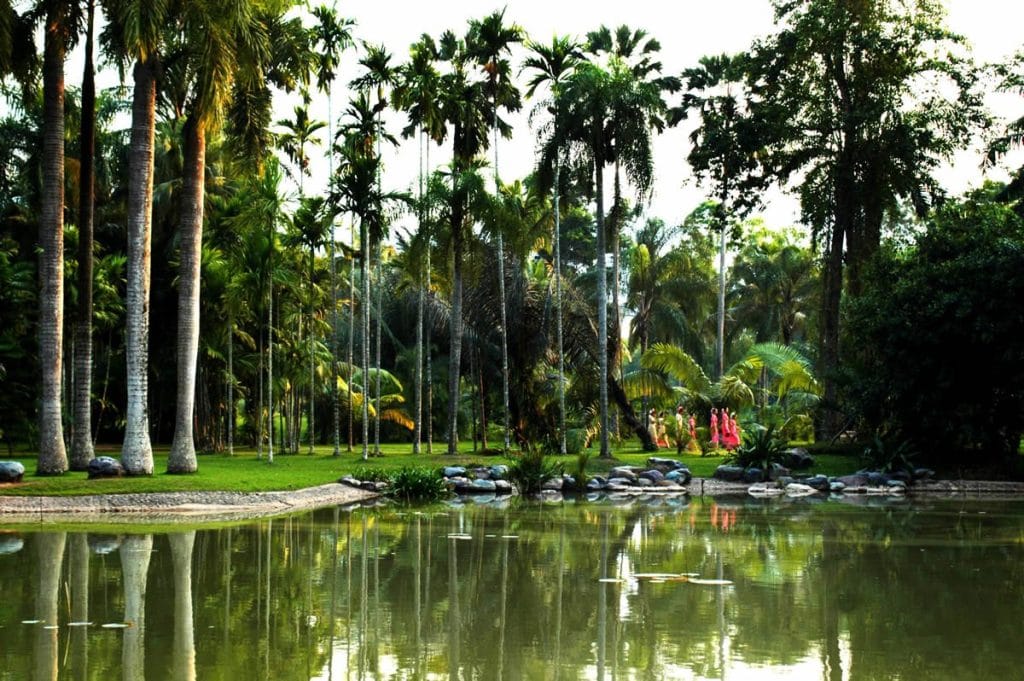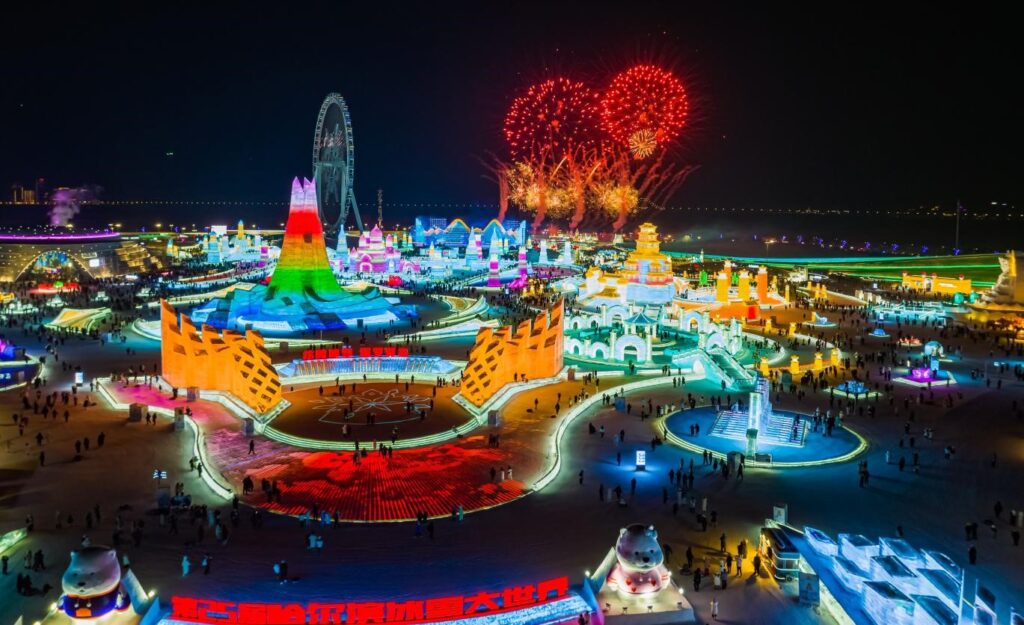
For travelers seeking diverse winter experiences, China presents an extraordinary tapestry of possibilities that range from the crystalline wonderlands of the north to the perpetual spring-like atmosphere of the south, offering unique adventures that cater to every preference and travel style.
Table of Contents
Part 1: Embracing the Cold – China’s Magnificent Winter Landscapes
Harbin: The Legendary Ice City

Nestled in China’s northernmost province, Harbin transforms into an enchanting frozen metropolis during the winter months, earning its reputation as one of the world’s most spectacular winter destinations through its masterful blend of natural winter beauty and artistic ice craftsmanship.
The World-Famous Harbin Ice and Snow Festival (December to February)
The festival stands as an architectural marvel where massive blocks of ice, harvested from the mighty Songhua River, are transformed into a breathtaking illuminated city that sparkles with countless LED lights embedded within crystal-clear ice structures reaching heights of up to 50 meters.
Cultural Experiences and Winter Activities:
- Immerse yourself in the spectacular Ice and Snow World, where international ice sculptors showcase their finest work through intricate frozen palaces and monuments
- Explore the historic European architecture along Central Street, where Russian-influenced buildings tell stories of cultural fusion
- Experience the unique thrill of winter swimming in the Songhua River alongside local enthusiasts who brave the frigid waters daily
- Discover the majestic Saint Sophia Cathedral, whose golden domes create a striking contrast against the snow-white landscape
Local Winter Cuisine:
- Warm your soul with traditional Northeast Chinese hot pot, featuring fresh local ingredients and unique regional broths
- Sample street food delicacies like candied hawthorns (bingtanghulu) and grilled squid
- Experience authentic Russian restaurants serving hearty borscht and authentic vodka
Essential Travel Tips:
- Plan for extreme temperatures that can plummet to -30°C (-22°F) during peak winter
- Book accommodations at least three months in advance for the Ice Festival period
- Layer clothing strategically: thermal undergarments, wool mid-layers, and windproof outer shells
- Protect cameras with insulated cases to prevent battery drainage in extreme cold
Snow Town (Xuexiang): China’s Winter Fairytale

Tucked away in the northeastern mountains, Snow Town presents visitors with China’s longest snow period, creating a photographer’s paradise and winter sports enthusiast’s dream from November through early April.
Photographic Opportunities:
- Capture the ethereal morning light as it illuminates snow-draped wooden houses and red lanterns
- Document local life as residents navigate their daily routines in deep snow
- Photograph stunning sunrise views over endless snow-covered pine forests
- Experience the magical “snow mushroom” phenomenon on tree branches
Cultural and Recreational Activities:
- Participate in traditional Northeast Chinese folk activities and performances
- Master the art of making traditional dumplings with local families
- Explore various skiing and snowboarding trails suitable for all skill levels
- Take guided snowshoe walks through pristine forest landscapes
Part 2: Escaping the Cold – Warm Winter Retreats
Yunnan Province: A Land of Eternal Spring
Kunming: The Spring City
Kunming maintains its reputation as the City of Eternal Spring with comfortable temperatures averaging 15°C (59°F) during winter months, offering visitors a perfect escape from harsh winter conditions.
Cultural and Natural Attractions:
- Wander through the geological wonder of the Stone Forest (Shilin), a vast limestone karst landscape formed over 270 million years ago
- Experience the vibrant atmosphere of Green Lake Park, where locals practice tai chi and traditional dance
- Explore the historic Yuantong Temple, Kunming’s oldest Buddhist temple, dating back to the Tang Dynasty
- Discover unique finds at the Flowers and Birds Market, a testament to Yunnan’s biodiversity
- Pay a visit to the largest fresh flowers whole sale market: Dounan Flower Market.

Xishuangbanna: Tropical Paradise
This autonomous prefecture offers visitors a glimpse into Southeast Asian culture and tropical landscapes within China’s borders.
Highlights and Experiences:
- Explore the Xishuangbanna Tropical Botanical Garden, home to over 13,000 species of tropical plants
- Visit traditional Dai villages and experience their unique architecture and customs
- Participate in traditional tea ceremonies using authentic Pu’er tea
- Discover the Wild Elephant Valley and observe these magnificent creatures in their natural habitat
- Experience the unique Dai Water Splashing Festival if visiting during special occasions

Natural and Cultural Activities:
- Take a boat trip along the Lancang (Mekong) River
- Visit the Menglun Nature Reserve
- Explore night markets featuring local Dai cuisine
- Participate in traditional handicraft workshops

Tropical Hainan Island: China’s Hawaii
As China’s southernmost province, Hainan Island provides a perfect tropical winter escape with its pristine beaches, lush rainforests, and rich cultural heritage.
Sanya’s Coastal Paradise:
- Experience world-class beaches like Yalong Bay, with its crystal-clear waters and white sand
- Explore the underwater world through scuba diving and snorkeling at Wuzhizhou Island
- Visit the iconic Nanshan Temple and its 108-meter tall Guanyin statue
- Indulge in fresh seafood at the famous First Market

Cultural Experiences:
- Visit traditional Li and Miao villages to learn about indigenous culture
- Explore the Binglanggu Li & Miao Cultural Heritage Park
- Experience traditional Li textile techniques, recognized by UNESCO
- Participate in coconut carving workshops and traditional music performances

Part 3: Unique Winter Experiences
Therapeutic Hot Springs
China’s geothermal resources provide natural hot springs perfect for winter relaxation and wellness.
Premier Hot Spring Destinations:
- Tengchong Hot Springs, Yunnan Experience volcanic hot springs with temperatures ranging from 40°C to 97°C, surrounded by stunning mountain landscapes and rich in therapeutic minerals.
- Conghua Hot Springs, Guangzhou A collection of modern resorts offering both natural springs and luxury facilities, perfect for combining with a Guangdong winter escape.
- Chongqing Hot Springs Mountain city hot springs providing unique experiences like cave pools and stunning valley views, complemented by local Sichuan spa treatments.
- Xianning Hot Springs, Hubei Known as “China’s Hot Spring City,” offering a mix of traditional and modern bathing experiences with mineral-rich waters.
- Anji Bamboo Hot Springs, Zhejiang Natural hot springs surrounded by serene bamboo forests, offering a peaceful retreat with traditional tea ceremonies and forest walks.

Visitor Tips:
- Book in advance during winter peak season
- Bring appropriate swimwear and personal items
- Limit soaking time to 15-20 minutes per session
- Check resort policies regarding photography and facilities
Health Benefits:
- Natural mineral compositions supporting joint health
- Traditional Chinese medicine-inspired treatments
- Stress relief and relaxation in natural settings
- Seasonal wellness programs combining hot springs with local therapeutic traditions

Winter Festivals and Cultural Celebrations
Chinese New Year Celebrations:
- Experience Beijing’s temple fairs, combining traditional performances with modern entertainment
- Participate in lantern festivals across various cities, each with unique local characteristics
- Witness traditional lion and dragon dances in historic towns
- Join local families in making dumplings and other festival foods

Regional Winter Festivals:
- Harbin Ice and Snow Festival: World’s largest winter festival
- Yunnan Torch Festival: Traditional Yi minority celebration
- Xuexiang Snow Festival: Featuring snow sculpture competitions and winter sports

Expert Travel Tips and Essential Information
Transportation Strategies
- Book high-speed rail tickets through official apps or websites up to 30 days in advance
- Consider overnight trains for long-distance travel to save on accommodation
- Use DiDi (China’s ride-hailing app) with English interface for local transportation
- Download offline maps and translation apps before your journey
Accommodation Insights
- Look for hotels with floor heating in northern regions
- Book rooms away from street noise during festival periods
- Consider traditional guesthouses (民宿) for authentic experiences
- Verify heating systems in southern hotels, as some may lack central heating
Health and Safety Considerations
- Maintain proper hydration despite cold weather
- Carry basic medications and first aid supplies
- Keep emergency contact numbers readily available
- Purchase appropriate travel insurance covering winter sports
Cultural Awareness and Etiquette
- Learn essential Mandarin phrases for basic communication
- Respect local customs during traditional festivals
- Remove shoes when visiting homes or certain temples
- Understand and follow regional dining etiquette

Frequently Asked Questions of Winter Travel in China
When is the ideal time to plan a winter trip to China?
The winter season runs from December to February. For the best experiences, visit in early December or late February to avoid peak holiday crowds while still enjoying winter activities. If you want to experience the Harbin Ice Festival, plan for mid-January to early February.
How should I prepare for different climate zones during one trip?
Pack versatile, layerable clothing that can accommodate temperatures ranging from -30°C in Harbin to 25°C in Sanya. Consider shipping heavy winter gear home before heading to tropical destinations, or renting equipment locally for specific activities.
Do I need a guide for winter travel in China?
It depends on your destination and comfort level. While cities like Beijing and Shanghai are easy to navigate independently, places like Harbin and Snow Town can benefit from local guidance, especially during festivals and peak seasons.
Is winter travel cheaper in China?
Generally yes, except during Chinese New Year (usually late January or February) and the Harbin Ice Festival. Many hotels offer winter discounts, but always book well in advance for festival periods.
How do I handle the extreme cold in northern China?
Layer your clothing (thermal underwear, wool layers, windproof outer layer), protect extremities with quality gloves and boots, and carry hand/foot warmers. Take regular breaks indoors to warm up.
Can I visit the Great Wall in winter?
Yes! Winter offers stunning snow views and fewer crowds. The Mutianyu and Badaling sections are well-maintained year-round. Visit in the morning for the best light and fewer tourists.
What about Chinese New Year travel?
Expect higher prices and crowded transportation as millions travel home. Book accommodations and transport at least 3 months ahead. However, you’ll experience unique cultural celebrations and festive atmospheres.
Is English widely spoken in winter destinations?
English services vary greatly. Major cities and international hotels usually have English-speaking staff, but download translation apps and save key phrases in Chinese for other areas.
How reliable is winter transportation?
High-speed trains rarely face winter delays. Flights might be affected by severe weather, especially in northern regions. Build some flexibility into your schedule during winter travel.
What winter festivals shouldn’t I miss?
Beyond the famous Harbin Ice Festival, consider the Longqing Gorge Ice Festival near Beijing, Yunnan’s Torch Festival, and various regional Chinese New Year celebrations.
Are hot springs safe to visit?
Yes, when following posted guidelines. Check water temperatures before entering, stay hydrated, and limit soaking time. Those with certain health conditions should consult their doctor first.
What emergency preparations should I make?
Save emergency numbers (police: 110, ambulance: 120), carry basic medicines, keep hotel address in Chinese, and purchase comprehensive travel insurance covering winter sports if needed.
Can I plan a combined winter sports and cultural trip?
Absolutely! Many destinations offer both. For example, combine skiing near Beijing with cultural sites, or mix Harbin’s ice festival with traditional Northeast Chinese experiences.
What’s the best way to handle altitude changes in winter?
When visiting high-altitude destinations like parts of Yunnan, take it easy the first few days, stay hydrated, and consider altitude sickness medication. Descend if you experience severe symptoms.
Remember to check current travel advisories, local regulations, and festival dates specific to your travel period, as these can significantly impact your experience and planning needs.
Plan your winter adventure now with us and experience the magic of China’s diverse landscapes and traditions!





